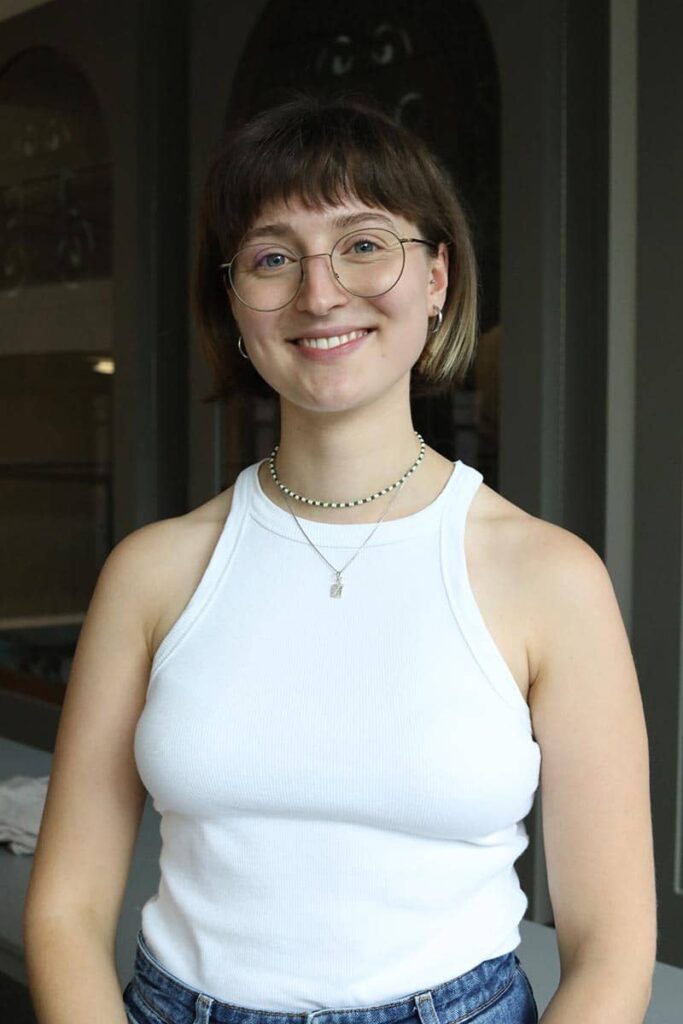LSTC Exchange Student Mia Federmann: Navigating an Unexpected Journey

Growing up in Germany, LSTC exchange student Mia Federmann’s academic path initially seemed far removed from the study of theology. She had dreams of becoming a teacher or pursuing a career in a different field entirely. “I always wanted to become a teacher… and then, after I graduated from school, I volunteered in a hospital and first I wanted to study medicine. Then I wanted to study psychology.” Then, a chance encounter with an expert in pastoral care at Marienhospital, in Stuttgart, Germany, where Federmann spent a year after completing secondary school, opened a door to a field she had never considered.
The pastoral care worker at Marienhospital, embraced difficult questions that intrigued Federman, but which doctors often shied away from, questions about quality of life, spirituality, and personal belief. At the time that Federmann met her mentor, she was volunteering on an obstetrics and gynecology floor, where she witnessed birth and death coexisting simultaneously. While doctors concerned themselves with treating a patents’ immediate needs, pastoral care workers concerned themselves with the spiritual wellbeing of their patients. For Federmann, seeing that path provoked a transformative realization. “It was like that woman appeared to me, and then I felt, okay, maybe I just should study theology because she studied theology,” Federmann recalls with a smile. “She impressed me as wise, and I wanted to become nearly as wise as she was.” It was enough to prompt a pivot: Federmann decided to embark on her own theological journey.
For Federmann, her pathway was supported in part by the Lutheran Church of Württemberg, to which she belonged since childhood, and which facilitated a scholarship that allowed her to study for a semester at LSTC. This proved to be a welcome opportunity for Federmann, who spent some of her early childhood in the United States. “I was in the United States when I was very young,” she recalls. “Though all of my schooling was in Germany, I always had the dream to come back one day,” Federmann explains of her interest in attending seminary in Chicago at LSTC.
Expectations and Aspirations at LSTC
This semester, Federmann is eager to continue her exploration of theology in a new context. She has set clear goals for her time at the institution, both academically and personally.
Federmann hopes to rekindle her personal connection to her faith, which she admits had waned during her academic journey in Germany. At LSTC, she has already experienced a welcoming environment encouraging her to delve deeper into developing her personal belief system.
But Federmann’s aspirations extend beyond personal spiritual growth. She is keenly interested in the intersection of theology and social issues, particularly the nuanced discussions surrounding race and power dynamics in the United States. “I’m hoping to get a new perspective on theology in a very different context than Germany,” Federmann says. “Here, they’re talking much more about racial problems, and the conversation around intersectionality is much bigger than what I’m used to in Germany.” She looks forward to expanding her awareness on topics fundamental to building a more equitable and just society.
A Diverse and Dynamic Environment
One striking aspect of Federmann’s experience at LSTC is the diversity she has encountered among the faculty, staff, and fellow students. This diversity stands in stark contrast to her previous academic experience, where professors in higher education often lack representation from various backgrounds.
“The professors and people that are teaching at LSTC are just more diverse,” Federmann observes, highlighting the importance of varied perspectives in academia. This diversity has enriched her academic journey, providing her with a more holistic understanding of theology’s place in society.
The Road Ahead
As Federmann continues her studies at LSTC, her goals remain dynamic and open-ended. While she can see herself a pastor in the traditional sense, she also acknowledges the possibility of a career in pastoral care or academia. “My future is open-ended,” she notes. “I study theology because I’m really interested in the topic.” Her ontological approach promises an abundance of opportunities in many fields, whether in pastoral care, academia, or another yet-to-be-discovered avenue.
In the halls of LSTC, Federmann has found not just an academic institution but a vibrant tapestry of diverse voices, ideas, and perspectives—a place where her personal beliefs can flourish and where her exploration of theology’s profound questions can continue to unfold. As she navigates the uncharted waters of theology, Mia’s journey exemplifies the transformative power of an open heart and a curious mind.